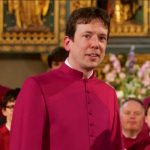The morning star is on the rise
And soon the dawn will fill the skies,
Foretelling of the coming Sun
Whose light will shine on everyone.
The Sun of justice, Christ, true Light,
And Mary, grace’s dawning bright,
And Anna, reddening the sky,
Have caused the night of Law to fly.
O mother Anna, fruitful root,
From you came your salvation’s shoot,
For you brought forth the flow’ring rod
That bore for us the Christ of God.
Christ’s mother’s mother, by the grace
Your daughter’s birth brought to our race,
And by her merits and her prayer
May we her favors come to share.
O Jesus, Virgin-born, to You
All glory is forever due.
To Father and the Spirit, praise
Be sung through everlasting days.
trans. c. 2009 Kathleen Pluth. This text may be used freely on July 25-26, 2019. All other rights reserved.
Latin original:
Nocti succedit lucifer,
Quem mox aurora sequitur,
Solis ortum praenuntians
Mundum lustrantis lumine
Christus sol est iustitiae,
Aurora Mater gratiae,
Quam, Anna, praeis rutilans
Legis propellens tenebras
Anna, radix uberrima,
Arbor tu salutifera
Virgam producens floridam
Quae Christum nobis attulit
O matris Christi genetrix
Tuque parens sanctissime
Natae favente merito
Nobis rogate veniam.
Iesu, tibi sit gloria,
Qui natus est de Virgine,
Cum patre et almo Spiritu,
In sempiterna saecula

 Charles Cole, Director of the London Oratory Schola Cantorum, speaks to EWTN’s Raymond Arroyo on the boy choir’s tour in America, highlighting sacred music of Spain:
Charles Cole, Director of the London Oratory Schola Cantorum, speaks to EWTN’s Raymond Arroyo on the boy choir’s tour in America, highlighting sacred music of Spain: